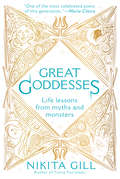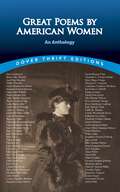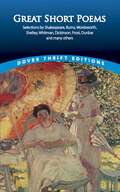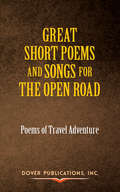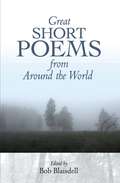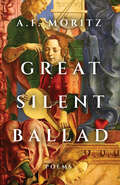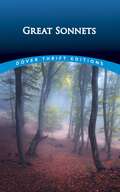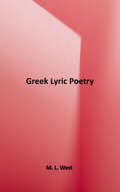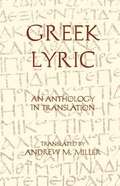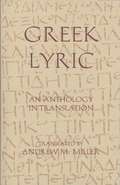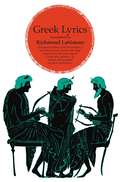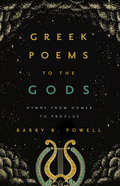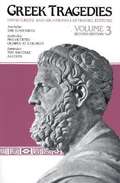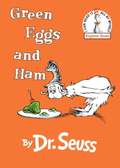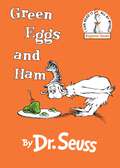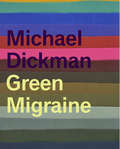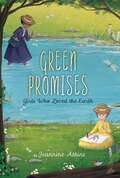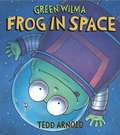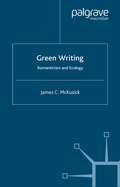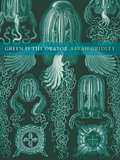- Table View
- List View
Great Goddesses: Life Lessons From Myths and Monsters
by Nikita GillBestselling poet, writer, and Instagram sensation Nikita Gill returns with a collection of poetry and prose retelling the legends of the Goddesses, both great and small, in their own words.With lyrical prose and striking verse, beloved poet Nikita Gill (Fierce Fairytales, Wild Embers) uses the history of Ancient Greece and beyond to explore and share the stories of the mothers, warriors, creators, survivors, and destroyers who shook the world. In pieces that burn with empathy and admiration for these women, Gill unearths the power and glory of the very foundations of mythology and culture that have been too-often ignored or pushed aside. Complete with beautiful hand-drawn illustrations, Gill's poetry and stories weave old and forgotten tales of might and love into an empowering collection for the modern woman.
Great Poems by American Women: An Anthology
by Susan L. RattinerFrom the colonial-era poets to such 20th-century writers as Marianne Moore and Sylvia Plath, this inspiring anthology offers a retrospective of more than three centuries of poems by American women. Over 200 selections embrace a wide range of themes and motifs: meditations on the meaning of existence, celebrations of life's joys, appreciations of the natural world, and many more."To My Dear and Loving Husband" and "Before the Birth of One of Her Children," written by America's first poet of note, Anne Bradstreet (1612-1672), appear here, along with "On Being Brought from Africa to America" and "On Imagination," by Phillis Wheatley (1753-1784), America's first great black woman poet. Selections also include more than a dozen beloved works by Emily Dickinson-"There's a certain slant of light," "I heard a fly buzz when I died," and "My life closed twice before its close," among others-as well as masterly verses by Hilda Doolittle, Gwendolyn Brooks, Edna St. Vincent Millay, Amy Lowell, Emma Lazarus, and numerous lesser-known authors.A superb introduction to America's women poets, this engaging collection offers an inexpensive and rewarding resource for students, teachers, and all lovers of fine poetry. Includes 4 selections from the Common Core State Standards Initiative: "A Bird Came Down the Walls," "The New Colossus," "Because I Could Not Stop for Death," and "On Being Brought from Africa to America."
Great Short Poems (Dover Thrift Editions)
by Paul NegriThis outstanding anthology of short verse offers poetry lovers an impressive sampling of more than 150 masterpieces spanning over 400 years of English and American literary history. Although short in length (the longest are 24 lines, most 16 lines or less), these poems are long on beauty, power, imagination, and originality.Included are such memorable compositions as John Donne's "Death Be Not Proud," Shakespeare's "When, in Disgrace with Fortune and Men's Eyes," "On His Blindness" by John Milton, William Blake's "The Tyger," Wordsworth's "I Wandered Lonely as a Cloud," Byron's "She Walks in Beauty," Shelley's "Ozymandias," as well as works by Alfred Lord Tennyson, Walt Whitman, Emily Dickinson, Gerard Manly Hopkins, Amy Lowell, William Butler Yeats, Robert Frost, Edna St. Vincent Millay, Langston Hughes, Dylan Thomas, Paul Laurence Dunbar, and many others.Attractive and inexpensive, this compilation of carefully chosen verse contains many of the most loved, most anthologized poems in the English language. Students, teachers, and any lover of great poetry will treasure this splendid collection. Includes 3 selections from the Common Core State Standards Initiative: "The Road Not Taken," "Loveliest of Trees," and "Ozymandias."
Great Short Poems and Songs for the Open Road: Poems of Travel Adventure
by Paul Negri American Poetry & Literacy ProjectGreat Short PoemsThis outstanding 150-poem anthology spans over 400 years of English and American literary history. Memorable compositions include Donne's "Death Be Not Proud," Blake's "The Tyger," Wordsworth's "I Wandered Lonely as a Cloud," Byron's "She Walks in Beauty," Shelley's "Ozymandias," as well as works by Tennyson, Whitman, Dickinson, Yeats, Frost, and many others. Includes three selections from the Common Core State Standards Initiative: "The Road Not Taken," "Loveliest of Trees," and "Ozymandias." Songs for the Open RoadCollection of more than 80 poems by 50 American and British masters celebrates travel, adventure and the many real and metaphorical journeys each of us take in the course of our lives. Works by Whitman, Byron, Millay, Sandburg, Service, Bliss Carman, Robert Louis Stevenson, Langston Hughes, Emily Dickinson, Robert Frost, Shelley, Tennyson, Yeats, and many others. Includes two selections from the Common Core State Standards Initiative: "The New Colossus" and "The Railway Train."
Great Short Poems from Around the World
by Bob BlaisdellThis keepsake gift volume ranges from the twelfth century B.C. to modern times to present an international sampling of the world's best short poems. The works of ancient Greek, Latin, Hebrew, and Persian poets appear alongside those of Arabic, Chinese, German, Indian, Japanese, and Hungarian authors, in addition to classics by English, Irish, and American writers.Featured poems include those of Pushkin ("I Loved You"), Yeats ("Down by the Salley Gardens"), Jonson ("On My First Daughter"), Hughes ("The Negro Speaks of Rivers"), Basho ("The Quiet Pond"), Bhasa ("The Moon"), and Tsvetaeva ("I do not think, or argue, or complain"). Additional selections include verse by Li Po, Sappho, Paz, Shakespeare, Dickinson, Blake, Campion, H.D., Heine, Frost, Lermontov, Swift, Rilke, and many others.
Great Silent Ballad: Poems
by A.F. Moritz“You don’t live if there’s no poetry: you don’t live at all, or if you appear to yourself to be living, you’re not. You really are living, though, even if you’re dead, because you do have poetry, poetry’s with you whether or not you know it…” Great Silent Ballad, beloved lyric poet A.F. Moritz’s twenty-second volume of poetry, in visionary terms forwards the assertion that poetry, a primordial reality, is in the current moment both the equal of, and the antidote to, the rest of present-day civilization and its suicidal nature. The book unfolds in seven short sections that probe such topics as the crucial value of childhood; a human person’s development through maturity and age; the perennially avant-garde nature of great poetry no matter what time and place; and poetry’s inherent involvement with hope and creativity, life and feeling, freedom and love. Great Silent Ballad also reprises Moritz’s longstanding celebration of common human conversation, the apex of which (he argues convincingly) is what we call “poetry”—meaning not just the art of verse, but our total access to the goodness of natural existence.
Great Sonnets (Dover Thrift Editions: Poetry)
by Paul NegriOne of the most powerfully moving and evocative forms of poetry, the sonnet has been popular for more than 450 years. Unlike many other poetic genres, the sonnet has never gone out of fashion and its popularity today remains unabated.This collection contains a rich selection of over 170 English and American sonnets by more than 70 poets, from the Renaissance to the 20th century. Included are great sonnets by the greatest poets. All have been carefully chosen for distinction in style or substance or both.Included are such masterpieces of the form as: "Shall I Compare Thee to a Summer's Day?" by Shakespeare; "Death Be Not Proud" by Donne; "On His Blindness" by Milton; "The World Is Too Much with Us" by Wordsworth; "Ozymandias" by Shelley; "On First Looking Into Chapman's Homer" by Keats; "How Do I Love Thee? Let Me Count the Ways" by E. Browning; "Acquainted with the Night" by Frost; "Euclid Alone Has Looked on Beauty Bare" by Millay; and poems by Spenser, Sidney, Burns, Blake, Byron, Longfellow, Tennyson, Poe, Swinburne, Wilde, E. A. Robinson, Dunbar, MacLeish, and many more.In this inexpensive treasury, lovers of poetry can study and savor the ways in which a host of great poets used the versatile sonnet form to express everything from the "light conceits of love" to the most profound meditations.Includes 2 selections from the Common Core State Standards Initiative: "The New Colossus" and "Ozymandias."
Greek Lyric Poetry (Oxford World's Classics Ser.)
by M. L. WestThe Greek lyric, elegiac, and iambic poets of the two centuries from 650 to 450 BC - Archilochus and Alcman, Sappho and Mimnermus, Anacreon, Simonides, and the rest - produced some of the finest poetry of antiquity, perfect in form, spontaneous in expression, reflecting all the joys and anxieties of their personal lives and of the societies in which they lived. This new poetic translation by a leading expert captures the nuances of meaning and the whole spirit of this poetry as never before. It is not merely a selection but covers all the surviving poems and intelligible fragments, apart from the works of Pindar and Bacchylides, and includes a number of pieces not previously translated. The Introduction gives a brief account of the poets, and explanatory Notes on the texts will be found at the end.
Greek Lyric: An Anthology in Translation
by Andrew M. MillerFrom the preface: "This anthology of translations is drawn from the little that remains of the lyric poetry produced in the Greek world during the seventh, sixth, and fifth centuries B.C. Following ample precedent, it includes not only monody and choral lyric but also short poems and frag-ments in the elegiac and iambic meters, even though the latter do not fit the etymological definition of lyric as "poetry composed to be sung to the lyre."
Greek Lyric: An Anthology in Translation
by Andrew M. MillerSuccessfully integrating elegance and a close fidelity to the Greek, these new translations aim to provide Greekless students with as close a sense as possible of how the Greeks themselves thought and wrote about the world. Miller's skillful introduction places the works in historical context and briefly describes the different metrical forms represented in the selections. Headnotes to each section highlight the background of the poet whose works follows. Complete with a glossary of names and a select bibliography.
Greek Lyrics: More than a Hundred Poems and Poetic Fragments from the Great Age of Greek Lyric Poetry
by Richmond LattimoreA collection of more than one hundred poems and poetic fragments from the golden age of Greek Lyric poetry. In this second edition of Greek Lyrics, translator and editor Richmond Lattimore brings together a vast assortment of seventh-and sixth-century Greek lyric, elegiac, and iambic poetry. For the Greekless student or curious scholar, these translations showcase the diversity of poetic subjects in classical antiquity, which range from love poems to medical inscriptions and drinking songs. Gracefully and robustly translated by a number of top-tier translators, this volume includes poets such as Archílochus, Callínus, Semónides of Amórgos, Hippónax, Tyrtaéus, Mimnérmus, Solon, Phocýlides, Xenóphanes, Theógnis, Terpánder, Alcman, Stesíchorus, íbycus, Sappho, Alcaéus, Anácreon, Hýbrias, Praxílla, Corínna, Simónides of Ceos, Pindar, and Bacchýlides.
Greek Poems to the Gods: Hymns from Homer to Proclus
by Barry B. PowellThe ancient Greek hymnic tradition translated beautifully and accessibly. The hymn—as poetry, as craft, as a tool for worship and philosophy—was a vital art form throughout antiquity. Although the Homeric Hymns have long been popular, other equally important collections have not been readily accessible to students eager to learn about ancient poetry. In reading hymns, we also gain valuable insight into life in the classical world. In this collection, early Homeric Hymns of uncertain authorship appear along with the carefully wrought hymns of the great Hellenistic poet and courtier Callimachus; the mystical writings attributed to the legendary poet Orpheus, written as Christianity was taking over the ancient world; and finally, the hymns of Proclus, the last great pagan philosopher of antiquity, from the fifth century AD, whose intellectual influence throughout western culture has been profound.Greek Poems to the Gods distills over a thousand years of the ancient Greek hymnic tradition into a single volume. Acclaimed translator Barry B. Powell brings these fabulous texts to life in English, hewing closely to the poetic beauty of the original Greek. His superb introductions and notes give readers essential context, making the hymns as accessible to a beginner approaching them for the first time as to an advanced student continuing to explore their secrets. Brilliant illustrations from ancient art enliven and enrichen the experience of reading these poems.
Greek Tragedies, Vol. 3
by David Grene Richmond LattimoreIn three paperback volumes, the Grene and Lattimore editions offer a selection of the most important and characteristic plays of Aeschylus, Sophocles, and Euripides from the nine-volume anthology of The Complete Greek Tragedies. This volume contains Aeschylus: The Eumenides; Sophocles: Philoctetes, Oedipus at Colonus; Euripedes: The Bacchae, Alcestis.
Greek Tragedy in Vergil's "Aeneid"
by Vassiliki PanoussiThis is the first systematic study of the importance of Greek tragedy as a fundamental 'intertext' for Vergil's Aeneid. Vassiliki Panoussi argues that the epic's representation of ritual acts, especially sacrifice, mourning, marriage, and maenadic rites, mobilises a connection to tragedy. The tragic-ritual model offers a fresh look into the political and cultural function of the Aeneid, expanding our awareness of the poem's scope, particularly in relation to gender, and presenting new readings of celebrated episodes, such as Anchises' games, Amata's maenadic rites, Dido's suicide, and the killing of Turnus. She interprets the Aeneid as a work that reflects the dynamic nature of Augustan ideology, contributing to the redefinition of civic discourse and national identity. In her rich study, readers will find a unique exploration of the complex relationship between Greek tragedy and Vergil's Aeneid and a stimulating discussion of problems of gender, power, and ideology in ancient Rome.
Greek Tragic Style
by R. B. RutherfordGreek tragedy is widely read and performed, but outside the commentary tradition detailed study of the poetic style and language of Aeschylus, Sophocles and Euripides has been relatively neglected. This book seeks to fill that gap by providing an account of the poetics of the tragic genre. The author describes the varied handling of spoken dialogue and of lyric song; major topics such as vocabulary, rhetoric and imagery are considered in detail and illustrated from a broad range of plays. The contribution of the chorus to the dramas is also discussed. Characterisation, irony and generalising statements are treated in separate chapters and these topics are illuminated by comparisons which show not only what is shared by the three major dramatists but also what distinguishes their practice. The book sheds light both on the genre as a whole and on many particular passages.
Green Beans and Other Silly Poems (Phonics Reader, # #18)
by Nancy Leber Holli LeberThis is the 18th book in the Phonics Reading Program developed by Scholastic. This book is very enjoyable with silly rhymes that will make anyone laugh.
Green Eggs and Ham
by Seuss<P>50th anniversary edition of the beloved Seuss classic. The story of Sam-I-Am who is determined to convince another Seussian character to eat a plate of green eggs and ham. Told in rhyme and with humor, Green Eggs and Ham is a fun story for young readers. <P>[This text is listed as an example that meets Common Core Standards in English language arts for K-1 at http://www.corestandards.org.] <P>Images and image descriptions available.
Green Eggs and Ham
by Seuss<p>“Do you like green eggs and ham?” asks Sam-I-am in this Beginner Book by Dr. Seuss. In a house or with a mouse? In a boat or with a goat? On a train or in a tree? Sam keeps asking persistently. With unmistakable characters and signature rhymes, Dr. Seuss’s beloved favorite has cemented its place as a children’s classic. In this most famous of cumulative tales, the list of places to enjoy green eggs and ham, and friends to enjoy them with, gets longer and longer. Follow Sam-I-am as he insists that this unusual treat is indeed a delectable snack to be savored everywhere and in every way. <p>[This text is listed as an example that meets Common Core Standards in English language arts for K-1 at http://www.corestandards.org.]</p>
Green Eggs and Ham: For Soprano, Boy Soprano, And Piano (Beginner Books(R))
by Dr. SeussJoin in the fun with Sam-I-Am in this iconic classic by Dr. Seuss that will have readers of all ages craving Green Eggs and Ham! This is a beloved classic from the bestselling author of Horton Hears a Who!, The Lorax, and Oh, the Places You&’ll Go! I do not like green eggs and ham. I do not like them, Sam-I-am. With unmistakable characters and signature rhymes, Dr. Seuss&’s beloved favorite has cemented its place as a children&’s classic. Kids will love the terrific tongue-twisters as the list of places to enjoy green eggs and ham gets longer and longer...and they might even learn a thing or two about trying new things! And don&’t miss the Netflix series adaptation!Beginner Books are fun, funny, and easy to read. Originally created by Dr. Seuss himself, these unjacketed hardcover early readers encourage children to read all on their own, using simple words and illustrations. Smaller than the classic large format Seuss picture books like How the Grinch Stole Christmas! and Happy Birthday to You!, these portable packages are perfect for practicing readers ages 3-7, and lucky parents too!
Green Migraine
by Michael Dickman"Reading Michael [Dickman] is like stepping out of an overheated apartment building to be met, unexpectedly, by an exhilaratingly chill gust of wind."-The New Yorker"These are lithe, seemingly effortless poems, poems whose strange affective power remains even after several readings."-The Believer"My master plan is happiness," writes Michael Dickman in his wonderfully strange third book, Green Migraine. Here, imagination and reality swirl in the juxtaposition between beauty and violence in the natural world. Drawing inspiration from the verdant poetry of John Clare, Dickman uses hyper-real, dreamlike images to encapsulate, illustrate, and illuminate how we access internal and external landscapes. The result is nothing short of a fantastic, modern-day fairy tale.From "Where We Live":I used to livein a mother now I livein a sunflowerBlinded by the silverwareBlinded by the refrigeratorI sit on a sidewalkin the sunflower and its yellowdownpour...Michael Dickman is the winner of the 2010 James Laughlin Award from the Academy of American Poets for his second collection, Flies. His poems are regularly published in the New Yorker. He was born and raised in Portland, Oregon, and teaches poetry at Princeton University.
Green Promises: Girls Who Loved the Earth (Girls Who Love Science)
by Jeannine AtkinsMeet three remarkable women who followed their dreams and paved a path for women in science in this gorgeously written biographical novel in verse from acclaimed author Jeannine Atkins.As a girl in the late 1800s, Mary Agnes Chase searched the river&’s edge for wild grasses, wondering how best to capture their likeness with pencil and paper. While her formal education ended in eighth grade, her skill at drawing plants helped land her a position at the Smithsonian Institution. Agnes became a world-renowned expert in grasses she discovered in meadows and mountains. Far away on the bank of another river, Marguerite Thomas Williams waded in to explore the rocks, wondering what secrets they might tell of long ago. Marguerite became a schoolteacher, then a teacher of teachers, but she wanted more. At last, a nearby university opened its doors to Black women, and after years of study, Marguerite became the first Black woman to earn a PhD in geology. Marguerite&’s student Sophie Mack Lutterlough&’s lifelong interest in insects led to her working her way from being an elevator operator at the Smithsonian Institution to becoming one of the first Black women researchers there in the late 1950s. With keen eyes and ambition, each woman followed her love of the natural world to blaze a trail for future female scientists.
Green Thoughts, Green Shades: Essays by Contemporary Poets on the Early Modern Lyric
by Jonathan F. S. PostThe book enlists the analytic and verbal power of some of today's most celebrated poets to illuminate from the inside out a number of the greatest lyric poets writing in English during the sixteenth and seventeenth century. Written by people who spend much of their time thinking in verse and about verse, these original essays herald the return of the early modern lyric as crucial to understanding the present moment of poetry in the United States.
Green Wilma, Frog in Space
by Tedd ArnoldA distracted frog + a rather froggy alien child + a spaceship on auto-pilot = an irresistibly goofy, action-packed, laugh-filled tale of mistaken identity
Green Writing: Romanticism and Ecology
by James McKusickThis book describes the emergence of ecological understanding among the English Romantic poets, arguing that this new holistic paradigm offered a conceptual and ideological basis for American environmentalism. Coleridge, Wordsworth, Blake, John Clare, and Mary Shelley all contributed to the fundamental ideas and core values of the modern environmental movement; their vital influence was openly acknowledged by Emerson, Thoreau, John Muir, and Mary Austin. By revealing hitherto unsuspected links between English and American nature writers, this book elucidates the Romantic origins of American environmentalism.
Green is the Orator
by Sarah GridleyGreen is the Oratorfollows on Sarah Gridley's brilliant first collection,Weather Eye Open, in addressing the challenge of representing nature through language. Gridley's deftly original syntax arises from direct experience of the natural world and from encounters with other texts, including the Egyptian "Book of the Dead" and the writings of Charles Darwin, Peter Mark Roget, William Morris, William James, and Henri Bergson. Gridley's own idiom is compressed, original, and full of unexpected pleasures. This unusual book, at once austere and full of life, reflects a penetrating mind at work--one that is thinking through and re-presenting romantic and modernist traditions of nature.
